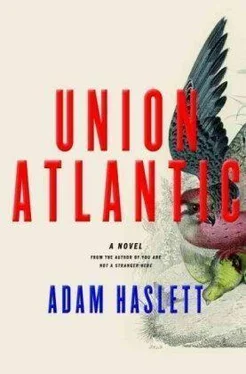But, oh, how they would rue the day now! Because at last Charlotte had done what she should have years ago: she had fired Cott Jr., the incompetent, collaborationist son of the old family lawyer who’d done little more than play at resisting the town’s grab, and she’d gone herself into the records down at the town hall. And there she’d discovered the mendacity of these idiots. Cott Jr. had said she had no legal recourse. But he was wrong. She’d filed her own suit now. She didn’t need an attorney to stand up before a judge. She would crush these scoundrels all on her own. And though it was late in the day, the trees already felled, that monstrosity already erected, still how sweet the victory would be when eventually she evicted that little charmer and razed his house to the ground.
Just thinking of it slackened the muscles of her shoulders and chest, as if for these many months she’d been wearing a shirt of chain mail, the bands of which were only now beginning to warm and expand, allowing her to breathe.
Heading up the road past the Bennetts’, she came to the low wooden fence that ran along the edge of the golf course. Wilkie and Sam nosed toward the gap that led onto the fairway. Seeing no one on the tee and the green clear, she followed them through onto the rough grass. The sky had brightened to a pale blue.
How insane it had all been. How perverted. This business with the house all of a piece with what had gone on at the school, where they had run her out for describing the world as it was and most everyone had simply gone along with it, so enamored of authority they couldn’t imagine disagreeing. For years she’d assigned a photo-essay on lynchings in her unit on the Jazz Age. Then one day the department head told her she would have to stop because the objections from parents had grown vociferous. She had continued nonetheless, distributing the materials at her own expense with a new cover page explaining the topic’s contemporary relevance, including quotes from the novels of Tim LaHaye, along with a line from one of the parents’ letters, complaining that the assigned reading was too negative.
“Yes. So was Dachau,” she’d said to the woman on parents’ night.
These people who behaved nowadays as if the world were a menace sent to sicken or debilitate their children. What meagerness of spirit. To treat your own offspring as so inherently weak. They pumped their addled sons full of Ritalin and Adderall and their sullen daughters with whatever the psychopharmacologist recommended, but the unimpeachable facts of history were considered bacteria. She had done nothing more than describe such people to themselves. For that, she had been deemed unfit. Her only contact with students now was the occasional child one of her former colleagues sent to her for tutoring.
Held back by the dogs sniffing at something on the fairway, Charlotte paused, looking down the slope of the first hole to the stream and the footbridge that led across it.
Her father had played this course in the summers. Each Memorial Day weekend he would drive them up here, along the post road through Connecticut and Rhode Island and across to Massachusetts. Her mother in the front seat, her eyes covered in dark sunglasses, her lacquered Nantucket creel on the floor by her feet, hands folded on her lap as she gazed out the window in controlled displeasure at one aspect or another of the arrangements — luggage or dinner plans or how soon on Tuesday their father would have to get a ride to Boston to catch the train back. Until August he would come only on weekends, spending the weeks alone at the house in Rye and commuting into the city. Most of the other families they knew went to Long Island or the Cape, but despite their mother’s annual disgruntlement they came here, to this town where their father’s family had always lived, to the house he’d grown up in and inherited.
What could Charlotte have known then of how she’d return here by herself? Nothing. At the time, the adventure seemed ever new. Rushing with Henry into the house ahead of their parents to claim their rooms, rolling on the cotton-tufted bedspreads, the air tinged with naphthalene and the richer scent of pitch from all the wood: the dark ceiling beams, the slanted floors, the narrow steep steps back and front. After a day or two, when her mother had aired the place out, the smell of mothballs faded, but the tar-like taste remained all summer, as fixed in the house as the old latch doors and twelve-pane windows. The red Jeep in the barn had a sticker for the lake, and they’d drive there with an ice chest full of lunch, stacks of towels, and an umbrella her mother read under while they swam. Later, running to the back of the field at dusk to pick asparagus among the tall grass; or across the road to Aunt Eleanor’s house for sugar or cooking oil, the screen door on the back steps slapping behind her; watching the slow, dying flail of the greeny-black claws of lobsters held between her father’s thumb and forefinger just before he dropped them into the boiler; the ridged metal shell-snappers set out with little forks to get at the thin meat in the legs; mosquitoes bouncing against the porch bulb after dinner when her father smoked a cigarette and looked back into the house at them like a man in a darkened theater watching the scene of a play. He’d wink at her and Henry on his way out the door with their mother to some party nearby, as if to say, lucky you, staying here, free to play at what you like, you always have more fun than me — and Charlotte could never tell if he meant it. Waking to the sound of the river, starlings in the crab apple tree by her window, eating cereal with Henry in his pajamas, the weightless late-morning hours before they went to the lake, idling in the backyard, on the mown grass, mountains of white cloud floating in the vast blueness of the summer sky.
A shield. That’s what the memories were, the ones that had risen in her with such force of late. A barricade thrown up against the depredations of the present.
Down on the second tee, a golfer arranged himself. Wilkie and Sam took no notice, their snouts still pressed to the ground. Of Charlotte’s drifts into reminiscence, the two of them did not approve. She found this hard, given all the love she had shown them over the years. She understood they missed the woods and the chance to run untethered by the river as they used to; they resented being leashed on every walk now.
When she’d first moved to Finden, it had been to rest, the summer after Eric died, for what she thought would be only a few months before returning to New York. There had been no living thing in the house with her, no pets or plants, the garden untended. It had stayed that way all through August because why settle in where you weren’t going to stay? Then her landlord in New York, not wanting any trouble after what had happened, had asked that she not renew the lease. Part of her wasn’t sure she could face going back in any case. That fall, she took a temporary job teaching history at Finden High while she figured out what to do. At some point, a colleague had come by with a cutting of a jade plant and they had gone together to a nursery to buy geraniums and bulbs.
For most of her time here, there had been only the plants and the garden, which she’d tended with great care. It was just in the last six or seven years that she’d taken in the dogs. Samuel had come from a litter of purebred mastiffs owned by George Jakes, the son of Mr. Jakes, who’d always been their plumber and who looked after the property during the year, when the family was back in Rye. George had brought the puppy over one day when he’d come to fix the tub and asked if Charlotte would mind the company because while his children wanted to keep all seven of them, it wasn’t practical.
Читать дальше












